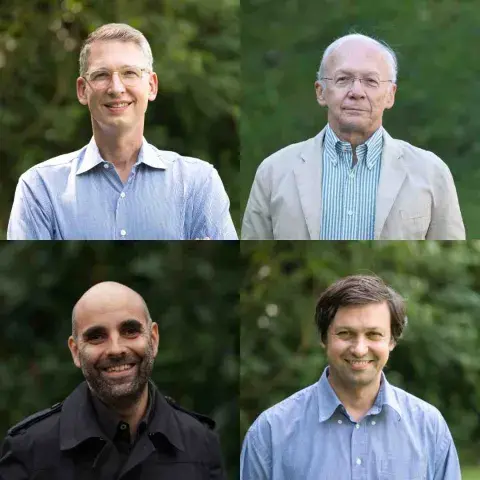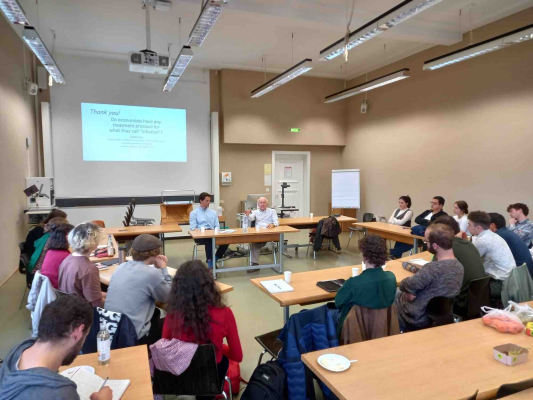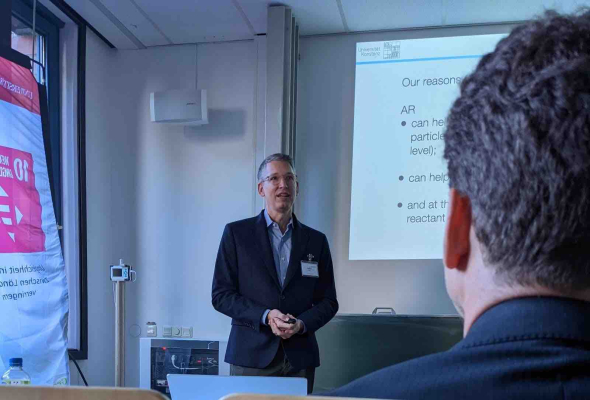
The festive season has recently begun, and with the Winter break promptly approaching, and students hitting the books during their finals week, we caught up with some professors to learn about their recent accomplishments and what they have been up to during this 2022.
After being twice postponed, the 35th conference of the Comité International d’Histoire de l’Art (CIHA) finally took place in January 2022 in Sao Paulo, Brazil, on the theme of Motion-Migrations. Professor Gabriel Gee, Art History and Visual Communication, had the opportunity to participate in this prestigious conference with a talk entitled "The ground beneath our feet: soil, souls, seeds," which reflected on the intersections between art history and artistic research through the TETI Press publication Mobile Soils he coedited in 2021 – more here. An interest in artists’ voices and research was already at the heart of the volume Maritime Poetics, coedited with Professor Caroline Wiedmer at Transcript Verlag, also in 2021 – learn more here. Professor Gee, therefore, pursued this engagement with the creation of a Swiss Artistic Research Network (SARN) group on art and industry, as well as a series of three Mobile Soils dinners co-organized at the SAE Greenhouse Lab at ETH Zurich, with the support of Pro-Helvetia. His interest in the relationship between art and food was mirrored in his course on Art and food proposed during the Spring '22 semester, which included an Academic Travel (AT) visit to La Cuisine, Centre d’Art et de Design in Négrepelisse, France. Professor Gee is currently finalising an edited volume on Hybrid Marines, which should be released in 2023.
In September 2022, Chemistry Professor Martin Bullock presented the first results of his current research project at the 38th Conference of the Division for Chemistry Education of the Society of German Chemists in Osnabrück. For the past year he has been working with the Zentrum für Schulqualität und Lehrerbildung Baden-Württemberg (ZSL) to develop augmented reality learning environments for the chemistry curriculum for high schools in Baden-Württemberg. He has developed two units to help students learn organic chemistry reaction mechanisms using different representational systems. One unit covers the radical chain reaction of the halogenation of alkanes, while the other unit, which is a new addition to the curriculum, covers electrophilic aromatic substitution reactions.
This participatory action research project involves intensive collaboration not only with the select committee of master chemistry teachers from several different schools throughout Baden-Württemberg, but also with the individual teachers who have volunteered to test the new learning environments in their classrooms. The preliminary results of data he collected in May and June of this year showed that students responded very positively to the new way of teaching, with indications of lower cognitive load and positive engagement during the lesson, as well as significant learning of these advanced concepts.
Before continuing the trials in October, Professor Bullock and the committee from the ZSL made some changes to the augmented reality learning environment in response to feedback from the teachers and the students involved in the first round of the study. The data collected so far indicate equally positive results, so the ZSL has decided to introduce the new materials at the annual training workshops for science teachers in March of 2023. At this event, Professor Bullock will demonstrate the augmented reality learning environments of both units so teachers can incorporate them into their lesson plans in the 2023-2024 school year.
Professor Andrea Terzi, Economics and Finance, likewise shared some exciting news on his latest 2022 ventures. On October 28, 2022, he was invited to give a talk at the Swiss National Bank (SNB) Research Seminar. His presentation entitled "Fiscal sustainability under a paper standard: two views from two paradigms," focused especially on adressing the whens and whys of when one should worry about the size of public debt. Additionally, what are the limits to public debt in contemporary economies and how does it differ from the times of the Gold Standard? And lastly, explaining why the view of economists has changed so radically since the 1960s, when President Eisenhower's pledged to balance the budget contrary to the mainstream view of the academics and of Nobel Prize Paul Samuelson. Ultimately, Professor Terzi analyzed how to use public money in dealing with future challenges, also considering climate change.
The following day, October 29, 2022, Professor Terzi participated with the Franklin Rethinking Economics Club in the Rethinking Economics Switzerland national gathering event at the University of Zurich. The theme of the event was "A pluralist take on inflation." Public policies in theory and in practice. The occasion was a full day of panel discussions on topics like inflation, central bank policies, generation change, gender representation, and more, with different policy experts. The first part of the event was focused on the communication between group members, allowing them to share personal Rethink Economics clubs' experiences, while the second part was devoted to the analysis of inflation and how the SNB is dealing with global challenges. Professor Terzi was also the opening speech speaker, acknowledging theories of inflation and policies for price stability, and was followed by Dr. Richard Senner – read an interview with Dr. Senner here – a member of the Research department at the SNB, who answered specific questions on the theme.
Finally, affiliated Professor of Political Science Oliver Strijbis has recently published a new article on the subject of ethnonationalism in the European Political Science Review. In his article, he demonstrates that the process of deindustrialization has strengthened ethnonationalist movements in Western Europe. More specifically, he depicts how a decline in the industrial labor force has led to an increase in vote shares of ethnonationalist parties such as the Scottish Nationalist Party or the Flemish Interest, such as the Vlaams Belang political party. The reason for this is that with deindustrialization the social class conflict is weakened, and thus instead allows for mobilization along ethnonational divisions. For his analysis, Professor Strijbis compared 15 ethnonational movements in Western European between the years 1918 and 2018.



